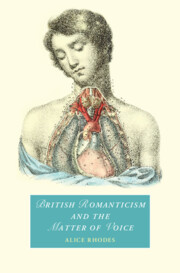Refine search
Actions for selected content:
6 results
9 - The Emerging Phonological Standard
- from Part II - Tracking Change in the History of English
-
-
- Book:
- The New Cambridge History of the English Language
- Published online:
- 23 October 2025
- Print publication:
- 23 October 2025, pp 246-270
-
- Chapter
- Export citation
Chapter 2 - John Thelwall and the Physiology of Speech
-
- Book:
- British Romanticism and the Matter of Voice
- Published online:
- 16 January 2025
- Print publication:
- 23 January 2025, pp 63-107
-
- Chapter
- Export citation
Introduction
-
- Book:
- British Romanticism and the Matter of Voice
- Published online:
- 16 January 2025
- Print publication:
- 23 January 2025, pp 1-16
-
- Chapter
- Export citation

British Romanticism and the Matter of Voice
-
- Published online:
- 16 January 2025
- Print publication:
- 23 January 2025
Chapter 12 - Sermons and Lectures
- from Part II - Literary Forms
-
-
- Book:
- The Cambridge Companion to British Romanticism and Religion
- Published online:
- 01 October 2021
- Print publication:
- 21 October 2021, pp 197-216
-
- Chapter
- Export citation
Chapter 14 - Actresses of Color and Shakespearean Performance
-
-
- Book:
- The Cambridge Companion to Shakespeare and Race
- Published online:
- 09 February 2021
- Print publication:
- 25 February 2021, pp 208-222
-
- Chapter
- Export citation
